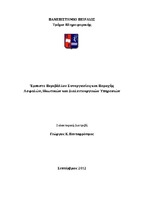Έμπιστο περιβάλλον συνεργασίας και παροχής ασφαλών, ιδιωτικών και διαλειτουργικών υπηρεσιών

Doctoral Thesis
Συγγραφέας
Πενταφρόνιμος, Γεώργιος Κ.
Ημερομηνία
2013-03-19Επιβλέπων
Πολέμη, ΔέσποιναΠροβολή/
Θεματική επικεφαλίδα
Διαδίκτυο (Internet) -- Μέτρα ασφαλείας ; Ιδιωτικότητα ; Web services ; Πληροφοριακά συστήματα -- Διοίκηση και οργάνωσηΠερίληψη
Η εξάπλωση των εφαρμογών Web 2.0 και η παροχή υπηρεσιών συνεργασίας και κοινωνικής αλληλεπίδρασης από τη μια πλευρά προσφέρουν σημαντικά οφέλη στους χρήστες από την άλλη προκαλούν νέες απειλές στην ιδιωτικότητά τους. Εκτός των τεχνολογικών προκλήσεων που χαρακτηρίζουν την ασφαλή ενσωμάτωση τεχνολογιών Web 2.0 σε ολοκληρωμένα Πληροφοριακά Συστήματα και πλαίσια υπηρεσιών, η διατριβή εντοπίζει την ανάγκη προστασίας της ιδιωτικότητας από τις διαδραστικές δυνατότητες δημιουργίας περιεχόμενου και αλληλεπίδρασης που παρέχονται στους χρήστες. Έχοντας σαν βασικό στόχο την εύρεση καινοτόμων λύσεων για την προστασία της ιδιωτικότητας σε συνεργατικά περιβάλλοντα, αρχικά καθορίζεται η αρχιτεκτονική ενός Έμπιστου Συνεργατικού Πληροφοριακού Συστήματος (ΕΣΠΣ) ικανού να καλύψει τις σύγχρονες απαιτήσεις για παροχή ασφαλών, ιδιωτικών και διαλειτουργικών υπηρεσιών. Η δεύτερη συνεισφορά της διατριβής περιλαμβάνει τη μελέτη επικινδυνότητας των κρίσιμων, ως προς την προστασία της ιδιωτικότητας, συστημάτων που ενσωματώνονται στην αρχιτεκτονική του ΕΣΠΣ εντοπίζοντας ανοιχτά θέματα τα οποία δεν καλύπτονται από τα αποτελέσματα της έρευνας πεδίου και αφορούν στην «ανεξέλεγκτη» χρήση των διαδραστικών υπηρεσιών και λειτουργιών που παρέχουν οι εφαρμογές Web 2.0. Η τρίτη και τέταρτη συνεισφορά της διατριβής επικεντρώνονται στην κάλυψη των ανοιχτών θεμάτων και αποτελούν τις βασικές καινοτομίες που προτείνονται για την προστασία της ιδιωτικότητας σε συνεργατικά περιβάλλοντα. Αφενός περιλαμβάνουν μια καινοτόμο αρχιτεκτονική διαχείρισης ταυτοτήτων η οποία αναγνωρίζει την αξιοπιστία των χρηστών ως δυναμικό χαρακτηριστικό της ταυτότητάς τους, ικανό να αναβαθμίσει τη χρήση των στατικά προκαθορισμένων ρόλων για την απόδοση προνομίων προσπέλασης στις διαδραστικές υπηρεσίες του συνεργατικού περιβάλλοντος. Αφετέρου, έχοντας σαν στόχο τη συλλογική προστασία της ιδιωτικότητας και τη λήψη έμπιστων αποφάσεων εξουσιοδότησης, καθορίζεται μια αναδρομική μέθοδος υπολογισμού του βαθμού αξιοπιστίας η οποία εκτός από τις αναφορές κακόβουλης συμπεριφοράς λαμβάνει υπόψη και άλλους κρίσιμους παράγοντες του συνεργατικού περιβάλλοντος. Η πέμπτη και τελική συνεισφορά της διατριβής έχει σαν στόχο να αναδείξει τα οφέλη υιοθέτησης του ΕΣΠΣ σε κρίσιμους τομείς της σύγχρονης Κοινωνίας της Πληροφορίας όπως αυτός της ηλεκτρονικής Διακυβέρνησης, μέσω της εφαρμογής του για την παροχή ασφαλών, ιδιωτικών και διαλειτουργικών υπηρεσιών προς νόμιμους μετανάστες (υπηρεσίες η-Μετανάστευσης).


